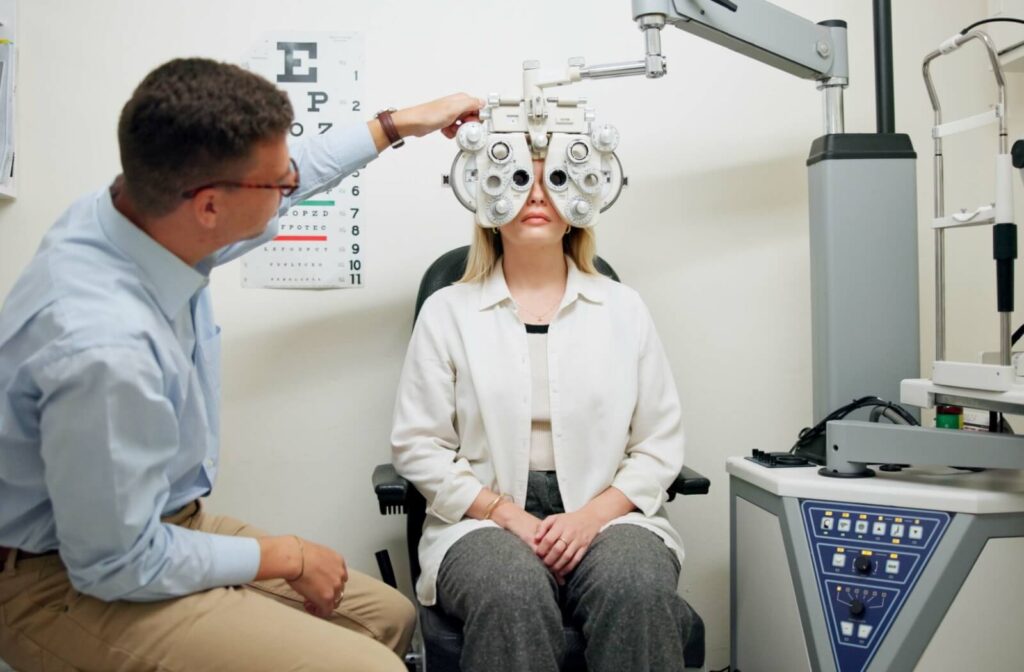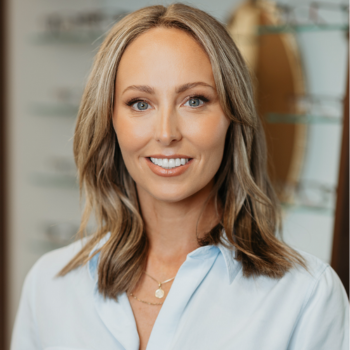Understanding the time involved in an eye exam helps you plan your day with confidence. Visits vary in length depending on the tests involved, your health history, and whether your pupils need dilation.
A typical eye exam takes between 30 to 60 minutes, though the exact duration can vary based on the type of exam, whether it’s your first visit, and whether additional tests like dilation are needed. Here’s a clear look at what determines how long you’ll spend in the chair.
What Happens in a Comprehensive Exam
As part of your eye exam, you’ll usually go through
- A review of your overall health and eye history
- Vision tests including acuity and depth perception
- A refraction procedure to refine your glasses or contact lens prescription
- Checks of eye alignment and muscle function
- Eye pressure measurements to screen for glaucoma
- Inspection of the front structures (e.g. cornea and lens)
- Examination of the internal structures, to check retina and optic nerve. At iSight Optometry, Optomap imaging is included in all complete eye examinations. Optomap imaging captures a wide-field (up to 200°) digital image of the retina, allowing detailed examination without needing to dilate the eyes. Of note, dilation might still be required if a more detailed or peripheral view is needed.
- Further testing such as OCT imaging, topography and computerized visual fields may also be performed when indicated.
During or after the exam, we will usually discuss the results and any recommendations based on the findings.
What Affects the Duration of Your Eye Exam?
Several elements influence how long an eye exam lasts. A full comprehensive examination typically stretches from thirty to sixty minutes. Some of factors that may affect this include:
- Whether it’s your first visit to that eye clinic
- The overall health and history of your eyes
- The need for additional tests or measurements
- Whether your pupils are dilated
Certain kinds of eye exams, such as contact lens fittings or diabetes-related assessments, generally take longer.
Typical Timeframes for Different Exam Types
Comprehensive Eye Exam
For a full assessment covering both vision and eye health, expect an appointment that takes between thirty and sixty minutes on average when eyes are healthy.
During this time, your optometrist evaluates:
- Visual sharpness using charts
- Eye coordination and alignment
- Muscle movement and pupil responses
- Internal and external eye health using slit‑lamp, retinal imaging and pressure tests
First-Time Patients or Complex Cases
If you are a new patient or are presenting vision-related symptoms, your exam may involve extra tests. In such cases, your exam could take between 30 – 75 minutes.
When Pupil Dilation Is Involved
If dilation drops are used to examine the back of the eye, the visit can stretch to an hour or more. That’s because it can take twenty to thirty minutes for the drops to take full effect.
Afterward, light sensitivity and blurred vision can last for a few hours, so bringing sunglasses or arranging a ride home is advised.
Why Some Appointments Take Longer
Factors that extend the duration include:
- Fitting contact lenses (learning how to insert and remove them, plus care tips)
- Extended diagnostic testing for diseases like glaucoma, cataracts or diabetic retinopathy
- Additional imaging or technology such as retinal scanning or corneal topography
If you have a complex medical history or the exam reveals concerns, we might spend extra time explaining results and planning follow‑up steps.
How to Prepare for an Efficient Visit

You can make the most of your appointment time by preparing in advance. Consider these helpful suggestions:
- Complete intake forms online when possible
- Bring your existing glasses or contact lenses
- Plan for light–sensitive vision by bringing sunglasses or arranging transportation if pupils will be dilated
- Note any symptoms or concerns in advance to share with the practitioner
Such steps can shave off several minutes from the overall visit.
What to Expect After the Exam
Once testing concludes, the eye care provider will often share findings immediately. If vision correction is needed, they’ll issue a prescription which you can then use for glasses or contacts. Follow‑up visits, if required, tend to be shorter—often around 15 to 30 minutes.
Moreover, if a potential condition like glaucoma or macular degeneration was identified, the visit may end with a recommendation to schedule further monitoring or treatment.
Planning Your Visit
If you’re scheduling time for an eye exam, here’s an example of how much time to allow:
- Comprehensive exam (no dilation): 30–60 minutes
- Comprehensive exam with dilation or new patient: between 30-75 minutes
- Contact lens fitting included: around 40–75 minutes
Preparing ahead can help avoid feeling rushed, and you’ll leave feeling informed about your eye health and vision needs.
Schedule Your Eye Exam
A comprehensive eye examination usually takes between thirty and sixty minutes, though dilation or additional testing may extend the visit to ninety minutes. Routine vision screenings can be much quicker, while contact lens fittings or complicated cases require more time.
If you’re near Kelowna and in need of an eye exam, don’t hesitate to book a visit with us at Sight Optometry.





